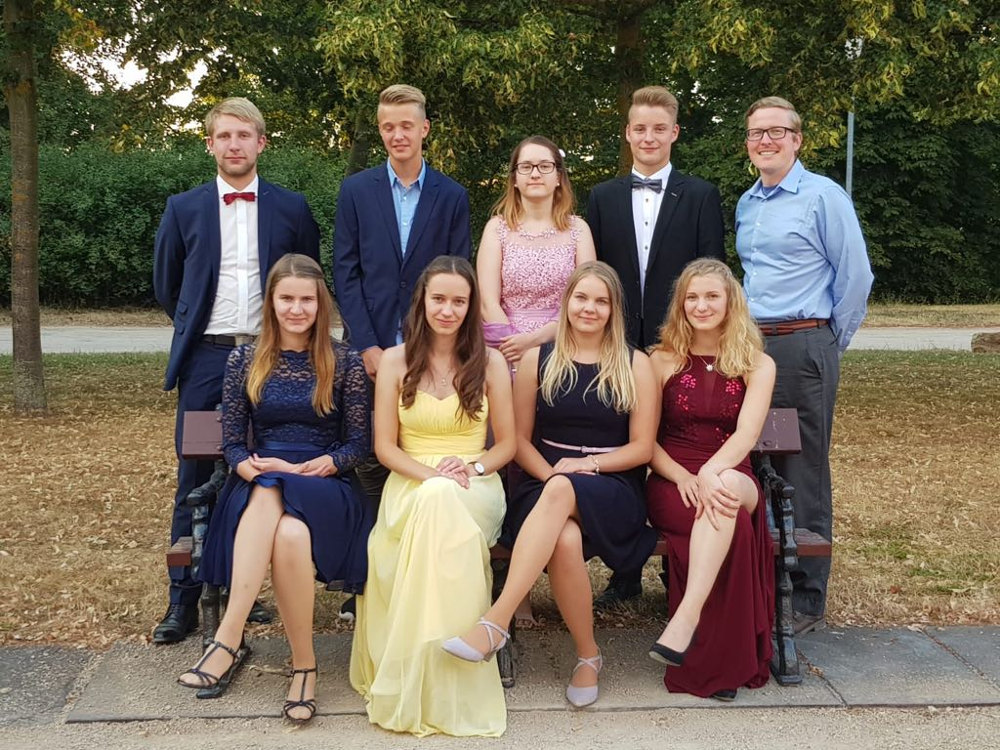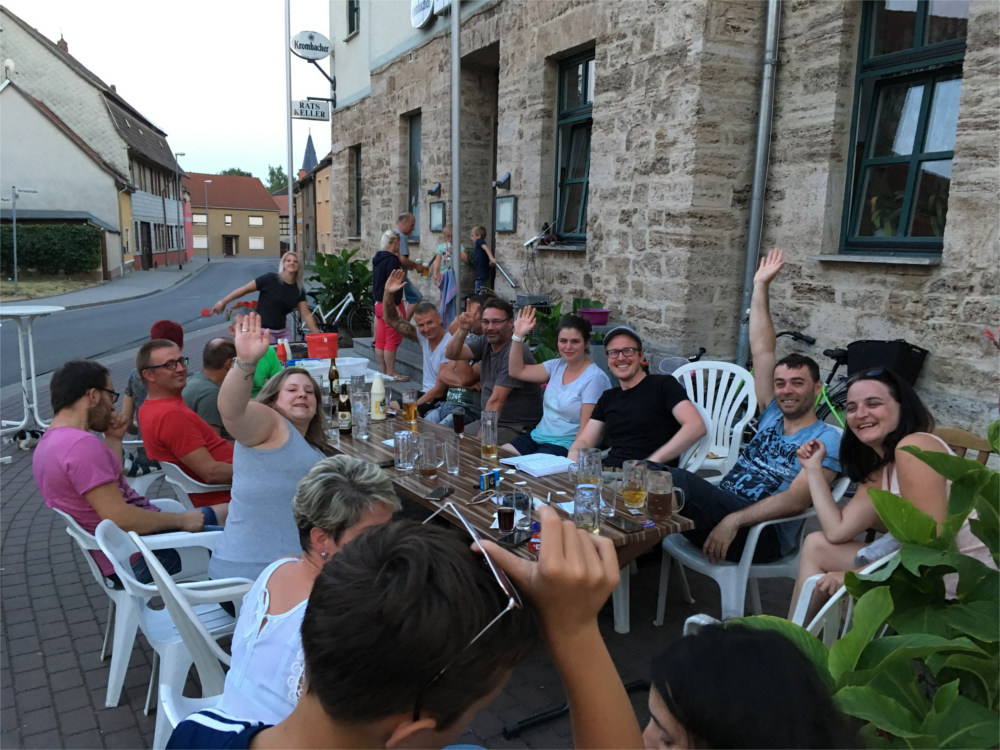A Summer out of the City
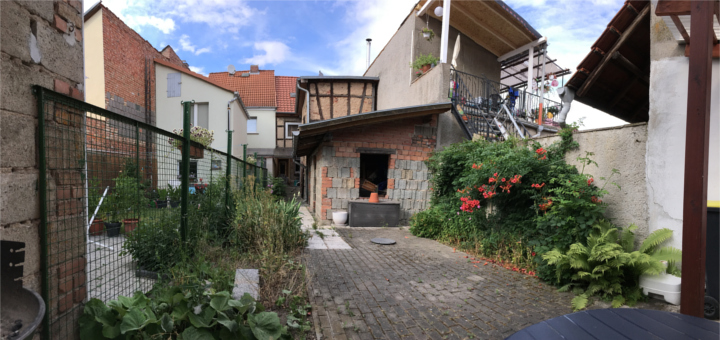
Never! I would never go to the US; it is just not safe there.” This is my initial conversation with my new neighbors in Clingen. I recently moved to this small village in order to be near the creamery where I will be interning for the next three weeks. I had happened to mention my need to live near Greußen to some people in choir and was surprised to learn of an empty house in Clingen, a neighboring village, that was available for immediate occupation. This house was this guy’s childhood home; his mother had passed and his older brother recently moved out. For a nominal price (since he was “not altruistic”), I was able to conveniently move into his half-furnished house.
I had kept it low-key my first evening. However on my second evening, I decide to break out the ukulele, singing a couple ditties in the backyard. The racket brings out both sets of neighbors to investigate. As we are in the midst of the soccer World Cup, the neighbor to the right asks what I think my country’s chances are for victory. I respond, poor, since we did not qualify. Oh, they both exclaim; the rumor in town was that I was an Englishman. The rumor? I just moved in.
The neighbor to the left will not end his constant bashing of the US and its gun laws; he cannot believe there is still such disregard for life. I finally cut him off and walk over to the neighbor on the right. I also do this because that neighbor is dramatically miming someone drinking. Logic, not language, tells me that he’s offering me a beer. Neighbor on the left heads back to his family as I continue a heavily gesticulated conversation with guy on right. Two things are learned: this town does not see many foreigners and there is a neighborhood street-fest every Thursday. Welcome to the neighborhood.
Straßenfest
My doorbell is promptly rung, and I am welcomed to a circle of benches five feet from my front door. My three sets of neighbors (the addition of the folks across the street) talk a bit about life, but the crowd wants to sing (or hear singing). I brandish my ukulele and begin working through my song list. My neighbors are quite open in their feedback of what they like. After a couple beers, I am able to convince my US-hating neighbor to sing “Wonderwall” with me. He is a bit unsure how repeats and codas work, which gives me a bit of schadenfreude when he cannot figure out the text. I may be a bad person.
As the dusk approaches, someone brings out some old GDR (East Germany) songs from their childhood times. It is at this point that a window down the street is flung open and an old women yells, “Ruhe!” My neighbors snicker. As I too was looking for some quiet, I pack away my ukulele for the evening. I am informed that on Friday nights the local bar (Ratskeller) hosts a grill out. The town expects my appearance, and I should bring my ukulele.
Ratskeller
Again, my doorbell announces that our street will now proceed as a group to the festivities in the center of town, which is only about 500 feet away. I arrive to an area filled with a couple of picnic tables and a handful of standing tables. There is a beer tap set up next to the grill; the expectation is that you keep track of your own consumption and settle your bill before you head home. As expected, a lull in conversation takes hold as I arrive. Luckily the townsfolk need only a few seconds to size me up before returning to their conversations.
It could not have been more than 20 minutes before the matriarch of my street prompts me to begin serenading the group. I brandish my ukulele and begin. As I am already uncomfortable, I lay out my case as if I am busking. Throughout the evening, a couple people throw in a euro or two. One father sends his daughter over with a coin. She seems really shy, so I hold out my hand; she pushes in and tosses the coin into the sound hole of the instrument. As the father laughs, I spend the next couple minutes fishing it back out.
As the evening comes to a close, I head over to close out my tab; the owner thanks me for the music and tells me the equivalent of “your money is no good here.” He confirms that I will come back next week. I agree as I have no other plans. The matriarch yells to the crown that our street is now leaving; we head back.
The Summer Rolls On
The second week arrives and I find that I have already read two of the four books that I brought with me from Erfurt. The place I am staying has no internet and my cell signal is weak; hiking in the area is nonexistent given the strong agricultural industry (i.e., fields and fields). As chance would have it, I have been invited to a wedding in the coming weekend and need to head back to my apartment to pick up wedding-appropriate clothing. This will give me a chance to replenish my book supply.
I head to a local bakery to scope out the local loaf varietals. I am directed to a bakery that “recently” opened and is headed by a young master baker. I greet the lady at the counter and ask to talk with the baker. As I wait, I read his master certificate hanging on the wall; he’s a couple years younger than I. He comes out front, and I explain my desire to work a shift with him in order to learn a bit more about the processes here and better prepare myself for my future endeavors. He quizzes me on local bakers in Erfurt, and he confirms that I do know people in the industry. I provide him my card, and he states that he will consider it and contact me. Spoiler Alert: I stop by two more times and he never reaches out.
The second street-fest arrives and no one has the energy to hang out, much to the chagrin of the street matriarch. She shares a few choice words as I shut the door; already clad in my PJs, I head to bed. The second week at the Ratskeller was also quite uneventful. However, as I already met the people of Clingen, I chose not to lay out my ukulele case with the hopes of some beer money. That said, I did receive my drinks and food without charge again… and I got pretty hammered.
The Wedding
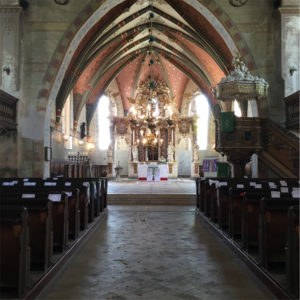 This wedding is my first non-American wedding I have attended. It is the marriage of the brother-in-law of the creamery owner. I understand the German folk to be quite non-religious (if not atheistic), and it is rare to have a church wedding. However, I find myself approaching this church in dress pants and a nice button up only to find that every other attendee is in full formal attire – I need to start asking more questions about these things.
This wedding is my first non-American wedding I have attended. It is the marriage of the brother-in-law of the creamery owner. I understand the German folk to be quite non-religious (if not atheistic), and it is rare to have a church wedding. However, I find myself approaching this church in dress pants and a nice button up only to find that every other attendee is in full formal attire – I need to start asking more questions about these things.
The sermon is odd and is built on the theme of clothing; the theme is heavily metaphored with ideas of expectations. The preacher (point of fact, a woman) seems to be so fixated on this metaphor that she has the couple dress each other – she produces a board with paper dolls. I am quite flabbergasted; one can hear the eye-rolling.
The congregation makes its way north for the reception at an old castle, which is a very cool option. I find my assigned table – the kids’ table. So, the ones getting grass stains on their knees are off in a corner, but all other members of my table are between 14 and 20. I am really starting to doubt that people actually believe that I am in my mid-30s. Similar to many other receptions, the bride and groom have provided disposable cameras at each table. The one at mine is currently being used to take pictures of the ceiling. Having nothing to lose, I order my table outside for formal pictures; we are going to use this camera appropriately!
Nearing the end of the roll, and while calming the excitement from the guys who have never had to wind between shots, the group heads back to the table. I try to spark conversations as each person is glued to their phone. I field some interesting questions, but my favorite is: Have you been shot before? As I shake my head, I see another guy playing with our camera and “peeking” inside the device; I think he just exposed the film…
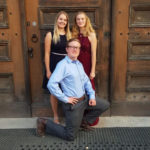 The evening progresses to our “surprise performance”. There are three of us that have been rehearsing four songs to perform that evening. I have named the band “One-Time Use”, as we like the table cameras will be disposed of after this evening. We perform “Chasing Cars”, “Hey There Dililah”, “Ein Kompliment”, and “Take Me Home Country Roads”. The revelers applaud and the newlyweds thank us. Not a bad gig with the other two playing guitar and me on the ukulele.
The evening progresses to our “surprise performance”. There are three of us that have been rehearsing four songs to perform that evening. I have named the band “One-Time Use”, as we like the table cameras will be disposed of after this evening. We perform “Chasing Cars”, “Hey There Dililah”, “Ein Kompliment”, and “Take Me Home Country Roads”. The revelers applaud and the newlyweds thank us. Not a bad gig with the other two playing guitar and me on the ukulele.
The Final Week
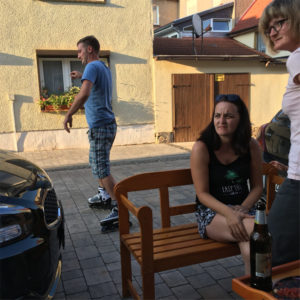 As the third and final week arrives, my neighbors suggest that I make them dinner for the final street-fest. I had been bragging about my deep-dish pizza, so I prepare two large pies for a dozen people to eat. I hear no less than ten times that two pizzas will not be enough for everyone. I assure them it will be fine.
As the third and final week arrives, my neighbors suggest that I make them dinner for the final street-fest. I had been bragging about my deep-dish pizza, so I prepare two large pies for a dozen people to eat. I hear no less than ten times that two pizzas will not be enough for everyone. I assure them it will be fine.
I prepare the dough in the afternoon, prep the pizza at my neighbor’s house as I have zero counter space at my place. I then use this neighbor’s oven as well as my neighbor’s across the street to bake said pizzas. Beer is provided, inline skates are produced, and the pizza is consumed. Even the most doubtful neighbors are pleased with how the pizza tastes. There is a slice left over.
My final Ratskeller performance has quite the turnout, which is good for the owner who continues to comp my food and drinks. This final evening contains the same sing-alongs and requests. However, tonight people take it upon themselves to grab my music and leaf through it until they find something they want to hear. I find myself playing songs that I barely know and would rather not play like “House of the Rising Sun”, “Folsom Prison Blues”, and “YMCA”. These are not bad songs, just songs better left for someone not playing an acoustic ukulele.
We talk a bit about the local dialect and the new words that I have learned during my time there (e.g., “Schaffen”, which is a frying pan). I also share my dislike of “total geil”, which is an overused version of ‘totally cool.’ Someone asks what is currently used in the US for additional exaggeration; I share my California experience with the phrase ‘hella good’. Accepting this, they begin describing things as “hello gut” (tr., hello good). I will miss the crowds on Fridays at Ratskeller in Clingen.
